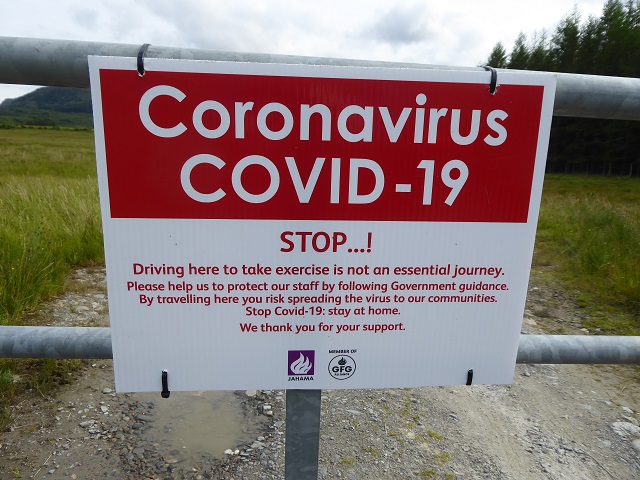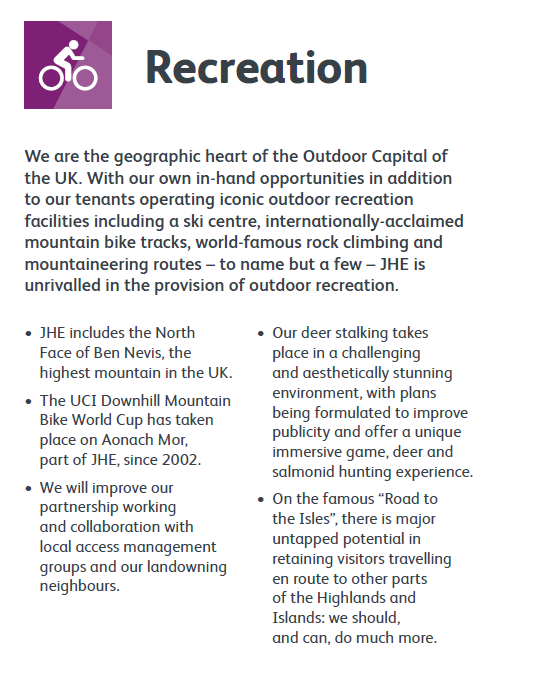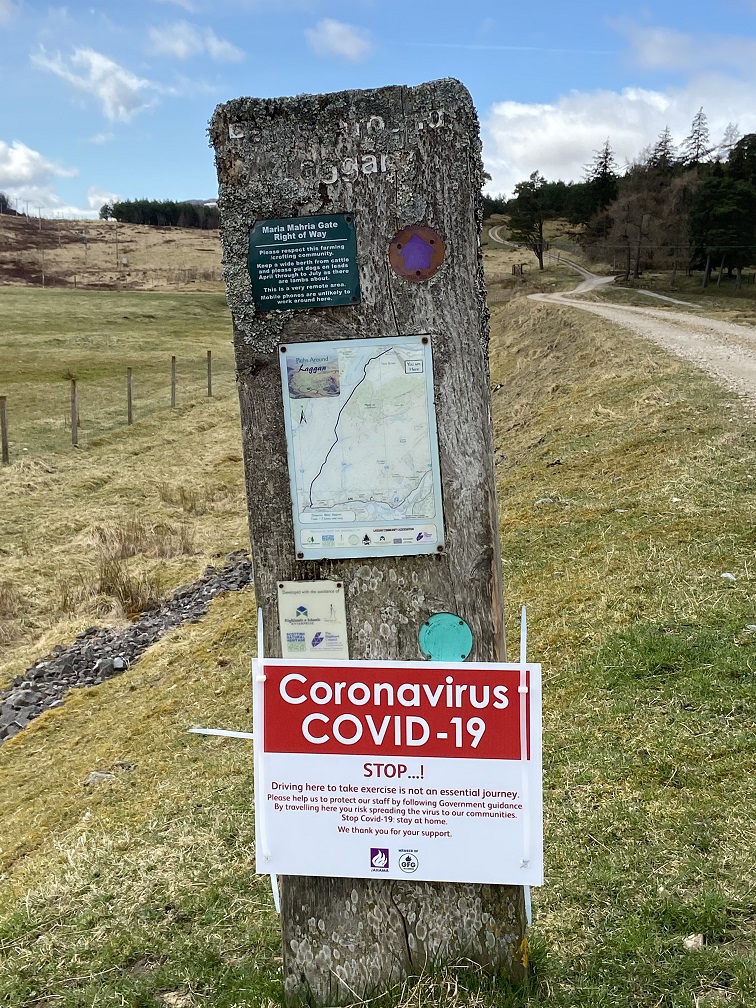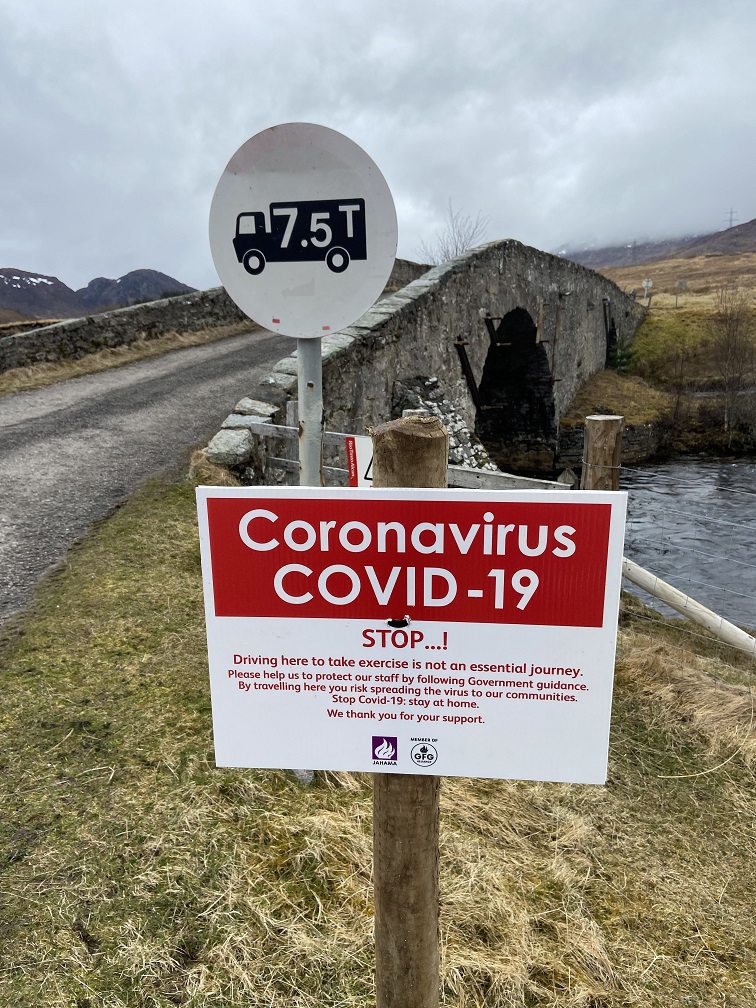
[Update: I had a phone call from Jahama Estates on 5th August to say all three signs referred to in this post and subsequent update have now been removed. I thanked them for this though my view remains the signs should never have been erected]
I have just come back from a week in Lochaber, on the northern edges of what should have been Scotland’s third National Park. The hills we walked and ran over were mostly entirely deserted and, unlike popular places further south, there was a merciful absences of signs. We did, though, come across this sign on the way to the Grey Corries. It was put up by Jahama Highland Estates (see here), which now owns a large chunk of the Highlands.
Someone clearly went to a great deal of trouble designing and erecting the sign which appears bespoke to the place – there are not many tracks they own which walkers are allowed to drive up. Jahama has not until now, as far as I am aware, been anti-access. Indeed it allowed people to drive up past this gate to park below the forest, shortening the long walk in.
The Covid-19 crisis has, however, shifted the basis of the debate about access and other civil liberties and introduced large elements of irrationality. That thinking, illustrated by this sign, needs to be challenged and eradicated:
Although access rights were not repealed by the Coronavirus Act, access to the countryside was for weeks reduced by government to a matter of “physical exercise”. Recreation, as covered by access rights, is a much wider term
The word “essential” was hijacked by the “don’t go into the countryside” propagandists. Was Brian Kellett, the conscientious objector who worked in the forestry at Torlundy just a few miles from here, doing something “essential” when he pioneered so many new routes on Ben Nevis in 1943 and 1944? When some people in mountain rescue teams started questioning whether going to the hills was “essential” they were setting a very dangerous precedent. We need to defend the liberty to do things that don’t harm others even if, as with Kellett, they might end with death.
There is no basis to the claim that had anyone driven up this track they would have risked harm to Jahama’s staff (most of whom were presumably furloughed as working in the outdoors like walking was also deemed non-essential) or the local community. Who in any case is Jahama’s local community? What about the people of Scotland being “the local community”? With lockdown lifted we saw three people in an eight hour day.
The sign, however, is still there just like all those anti-access signs after the Foot and Mouth Crisis. If you see such signs, please report them to your local access authority. Unfortunately, I have heard some access officers are being forbidden from making site visits on the basis that these are “non-essential”. The abuse of language goes far deeper than the issue of signage, it has implications for the very basis of our access rights.
Covid-19 is very dangerous but not in the great outdoors and we need to defend the right to travel to the countryside should there there be a second wave of Covid-19.
Update
A few hours after writing this I was contacted by Jahama Highland Estate stating that while they believed the sign was appropriate during lockdown it “should have been taken down when the Covid 19 phases and the access guidance changed, as we all started to move out of lockdown” . They also stated: “We would like to apologise unreservedly for any misunderstanding in relation to visitors wishing to take responsible access to Jahama Highland Estate” and they would ask staff to remove the signs as soon as possible. I have written back to them thanking them for this.
They attached a copy of their new vision document and I have extracted the section on recreation:

And a few hours later I received the following from a reader which I have also now reported to Jahama


I was clearly wrong about the sign being bespoke to the Grey Corries. Please, if you see signs, take photos and report them. It does make a difference.
Well done Nick – and full marks to JHE (if they follow through on their words). Post-lockdown, people who previously didn’t spend much time in the countryside have embraced it. We should be encouraging these new found freedoms – and educating where necessary in what responsible use of the countryside means. Instead all too often landowners and national parks would like to retain the quiet they saw in lockdown, and some members of “local communities” would rather those newcomers just turned around.
In my area of Scotland you can see this in the way some have turned on (mostly young) folk trying to enjoy the countryside, but not acting responsibly. Even when the police are called and report no evidence of illegality, I still see extensive newspaper reports on how “upset” the “local community” is. No attempt (other than by the police, it would appear – well done them) to understand, educate and support. Here’s an example of this extreme attitude: https://www.peeblesshirenews.com/news/18603504.drinkers-trash-peeblesshire-beauty-spot—sparking-outrage/ – no mention that this particular “beauty spot” has been “trashed” by locals for at least the thirty years I’ve lived here.
It’s a shame that, collectively, we can’t treat post-lockdown as an opportunity for landowners and national parks to put up more “welcome to the countryside” signs, and embark on appropriate education – rather than leaving up their old, illegal, COVID signs. The clock can’t be turned back – so, without this re-focus, I can’t see anything but trouble ahead…
Good work Nick. Looks like the estate workers are going to be busy with wire cutters!
The abuse of language has been a universal feature of the last few months. Covid-19 is a disease, one of many coronaviruses, nothing more, nothing less, and humankind has needed to deal with such things for centuries. The construction of associated language patterns and lexica provides an opportunistic means to re-frame a disease as “other”. Hence we have had “R Rate”, “furlough”, “lockdown”, “social distance” (and its mutation into a verb, which is truly odd), “physical distance”, “essential journey” and much more that has become an uncomfortable and enforced common usage. It’s long been a methodology of autocracy to invent language at such times as a pretext for the inappropriate wielding of power. We, who might know little different, accept the need for behaviour modification as a result, and (with some notable exceptions, see Benny Rothman, for example) and comply more or less meekly, succumbing to the ordinances of the relevant establishment; in this case Jahama Estates.
I won’t witter on, but recommend anyone interested to read Noam Chomsky on linguistics, power, political science and more importantly, analytic philosophy.
In short, we’ve been taken for a linguistic ride.
Very well put Adrian. Language is a key tool for the people who rule us as it helps determine how people think.
Thanks Nick! It might be that my 3 years studying such stuff at Sheffield Uni weren’t entirely wasted by spending time in the hills… For anyone developing a taste for such things, the associated doctrine of Ecological Linguistics is well worth pursuing. As a taster, have a look at the work of Arran Stilbe: https://www.glos.ac.uk/academic-schools/education-and-humanities/staff-profiles/pages/s2106028-arran-stibbe.aspx.
As soon as we adopt the lexicon presented, we’re guilty of collusion….
Thank you for this. I was blissfully unaware how extensive this particular investment group’s holdings in Scotland had become. One thing has definitely occurred in Lochaber since this “body” stepped up their involvement in management and ownership of so much hill land across the Scottish hills. There are a lot more places where, beyond a newly installed metal gate, usually firmly locked …a full vehicle track goes on up the hill where in the past only a traditional footpath once might have gone. The company would have needed a lot more signs to indictae their wishes than so far reported! ( The new “money spinner” is mini hydro schemes. I can think of at least ten local ones constructed on areas they hold title to , built since 2015 where the fully graded access track said to be necessary while building the header dam and pipestock is going to take well over a decade to blend back into the underbrush and bracken. Strangely half a century ago the old forestry track-laying tractors used for ploughing and planting got up and down across open hillsides without so much permanent access mess.(the drainage compromising plough work of course was sacrilege.)
Nice one Nick. I don’t u understand enough about National Park’s but what I seen and read on Loch Lomond I hope wee don’t have a third National Park People in power and the Councils have abused their power’s
You write about the (ab)use of language but you say “Lochaber…should have been Scotland’s third National Park”. Having regularly read your blog and despaired at the questionable management of the two existing NPs could you please explain why there should be another one?
Hi Malcom, a very good question. My response has two parts. The first is that the concept of a National Park is a very powerful idea. People generally understand that National Parks should be different. When a sea eagle is found poisoned that is bad enough but when that sea eagle is found poisoned in a National park that is particularly shocking. None of our other designations have the same resonance. Its hard to get anyone to care about Special Protection Areas, Special Areas of Conservation, Site of Special Scientific Interest or even National Scenic Area. The only other designation that has some meaning to the public is National Nature Reserve and that too has been sadly degraded. The second part of my answer is that arguably over the last 10 years or so most public authorities have lost sight of their original purpose – local councils, Scottish Natural Heritage, our Enterprise Agencies and are being mismanaged. That is linked to austerity, increasing centralisation of government in Scotland etc. It doesn’t mean however that we should abolish all those public authorities. So I believe we should be aspiring for more National Parks in Scotland but also that before we do so we need to reform our existing National Parks so they start to deliver their original purpose. I hope that makes sense. Nick